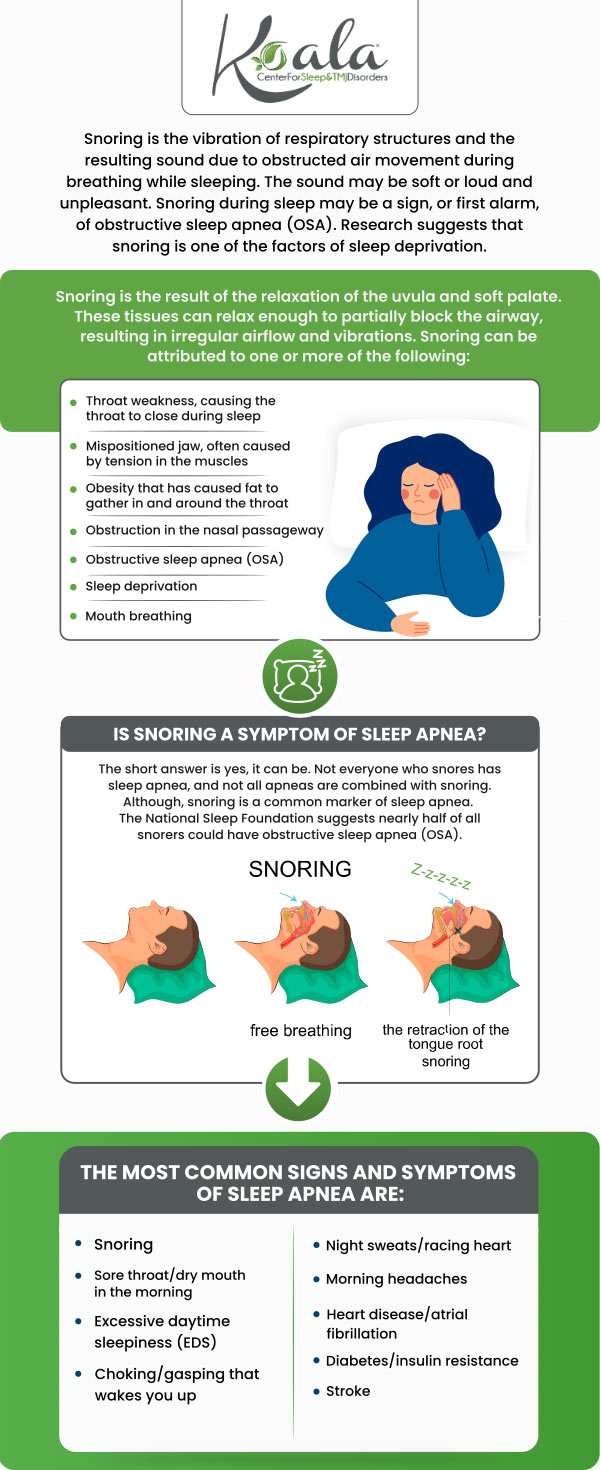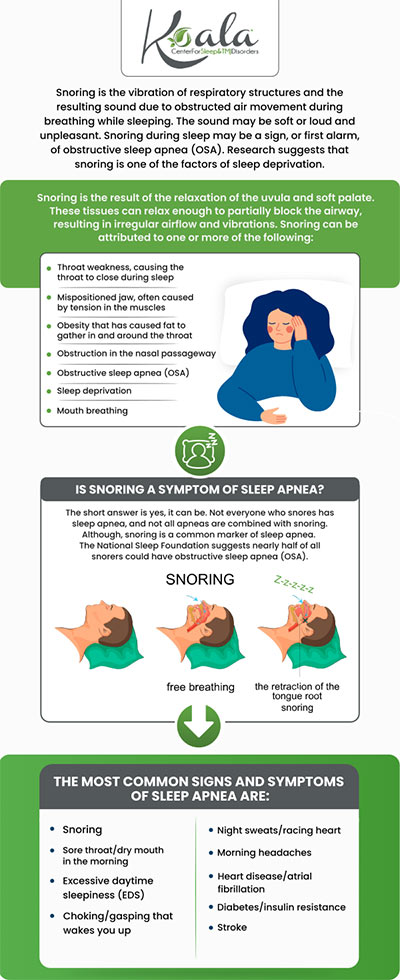What Are the Causes of Snoring?
Koala® Center For Sleep & TMJ Disorders can help you stop or significantly reduce your snoring, so both you and your partner can get a good night’s rest. We serve patients from all over the USA. Locations in Bloomington IL, Peoria – Dunlap IL, El Paso TX, and Wausau WI. For more information call us at one of our clinics today or request an appointment online.


Table of Contents:
What is the main cause of snoring?
Is snoring bad for your health?
How can I stop snoring naturally?
What is the treatment for snoring?
We are all familiar with the sound of snoring, whether it is from a spouse, parent, friend, or roommate. This audible noise is caused when the muscles in the soft palate (roof of the mouth), tongue and throat relax, partially blocking the airway and vibrating. The more narrowed the airway becomes, the more forceful the airflow is, and the snoring becomes louder.
Snoring happens during sleep when air cannot flow freely through the airway when breathing. When the airway is narrowed or partially blocked, it can result in the sound of snoring as breathing causes the tissues of the upper airway to vibrate. There are many causes of snoring, including:
– Obstructive Sleep Apnea — Although not everyone who snores has obstructive sleep apnea (OSA), most people with this type of sleep apnea snore. Although it frequently goes undiagnosed, OSA is a common sleep-related breathing disorder that affects millions of Americans. It is characterized by repeated pauses in breathing during sleep which is due to either a partial or complete collapse of the airways. People with sleep apnea tend to snore loudly with periods of silence as breathing stops; when they resume breathing, it can sound like snorting, gasping, or even grunting.
– Alcohol and Sedative Medication — By relaxing the muscles that support tissue around the airway, alcohol and other sedatives cause snoring. Chronic snorers, including those with sleep apnea, who drink alcohol experience more severe snoring than those who do not. To reduce snoring, doctors often recommend avoiding alcohol and sedative medications during the hours leading up to bedtime.
– Smoking — Tobacco usage in the form of cigarettes, cigars, cigarillos, or pipes is another risk factor for snoring. While it is not exactly clear why people who smoke are more likely to snore, researchers believe that it may be due to upper airway inflammation and edema (collection of fluid). Although it can take time, stopping smoking has been shown to improve snoring.
– Head and Neck Anatomy — The size and shape of certain structures in the head and neck can constrict the airway and lead to snoring. For example, people with a deviated septum are more likely to snore. A deviated septum occurs when the wall between the nostrils is bent or skewed to one side. Additionally, having a small jaw, polyps in the nasal passages, or an enlarged tongue or tonsils can contribute to snoring.
– Chronic Nasal Congestion — By reducing the flow of air through the airway and causing the airway to collapse, having a stuffy nose during sleep may lead to snoring. Allergy or infection are the most common causes of nasal congestion, but other contributors include having a deviated septum or being in an arid environment. Nasal congestion can become chronic and lead to habitual snoring when these conditions persist over time.
In addition to the aforementioned causes, the following can also contribute to snoring:
– Sleeping on the back (supine position)
– Being overweight or obese
– Advanced age
– Hypothyroidism
While snoring on its own is not considered dangerous or deleterious to one’s health, obstructive sleep apnea (OSA), which is a main cause of snoring, can be. OSA can cause multiple pauses in breathing throughout the night, which can deprive the brain and other organs of oxygen, leading to tissue damage.
There are several ways to stop snoring:
– Side sleeping
– Reducing nasal congestion
– Using an oral appliance
– Losing weight
– Using a humidifier
– Avoiding drinking alcohol before bed
– Practicing tongue and throat exercises
– Avoiding dairy products before bed
There are many treatments for snoring, including oral appliances, dental orthotics, and CPAP. To find out which snoring treatment will work best in your situation, visit our sleep clinic today!
For more information call us today to book an appointment for TMJ treatments. We look forward to serving you!

Additional Services You May Need
▸ KoalaKIDZzz®
▸ Sleep Apnea
▸ Snoring
▸ TMJ Disorder
▸ Fatigue
▸ Sleep Disorders
▸ Weight Loss
▸ CPAP Alternative
▸ Oral Appliances




